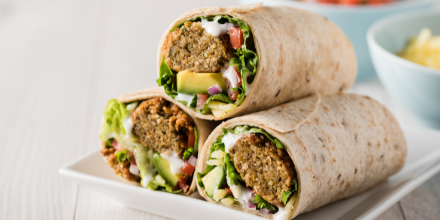The trend of eating plant-based, or vegetarian, continues to grow. Filling your diet with fruits, vegetables, whole grains, beans, and nuts will also fill your body with antioxidants, vitamins, and minerals. Choosing the right combination of these foods can lead to maximum health.
Why Vegetarian?
Plant-based diets are naturally lower in fat and sugar, higher in fiber, and packed with powerful antioxidants and phytonutrients. It’s not surprising that these diets have been linked to a reduced risk of cancer and cardiovascular disease. They’ve also been known to help with weight management.
Types of Vegetarian Diets
There are multiple ways to follow a vegetarian diet. Just like all meal plans, it’s important to find what works for you.
- Lacto-ovo Vegetarians: When people think of vegetarians, they typically think of this type. These vegetarians do not eat meat products or fish, but they do eat dairy and eggs. Foods such as cheese, eggs, and ice cream are all permitted.
- Vegan: This plan excludes ALL animal-derived products, including dairy, eggs, and honey.
- Flexitarian: This plan focuses mostly on vegetarian principles and the importance of vegetarian diets, but allows small amounts of meat and dairy.
Maximize Your Nutrition
- Manage Protein – As you fill your plate with fruits and veggies, make sure you are meeting your protein needs. Add beans, nuts, seeds, and chickpeas to your dishes. Tofu is a great source of protein that you can add to stir-fries, soups, and salads.
- Consider Calcium – If dairy products are eliminated, make sure you eat from other calcium sources such as leafy greens or fortified orange juice. Vegetarian eaters may need a calcium supplement to make sure their needs are met.
- Iron – Meat can be a good source of iron in the form of heme iron. Vegetable sources can also be a source of non-heme iron. This type of iron is found in nuts, seeds, and vegetables. It is not absorbed well, but it’s still a source of iron. Pair it with vitamin C to increase absorption. Additionally, look for foods fortified with iron such as pasta, bread, and cereal.
- Vitamin B12 – Plant sources do not contain any B12. There is B12 in dairy, eggs, and fortified foods. This vitamin should be monitored and a supplement may be needed.
Getting Started
Considering going vegetarian? Start slow and gradually add more plant-based foods to your plate a little at a time.
- Add a side salad to your lunch.
- Pack an apple for your afternoon snack.
- Make a trail mix with nuts, seeds, and dried fruit.
- Add some veggies to your eggs in the morning.
- Make a fresh fruit smoothie.
- Use nut butter on toast in the morning.
- Try tofu in stir-fry.
- Drink a glass of tomato juice with your breakfast.
- Bring veggies and dip as an appetizer.
- Grill squash as a side dish for dinner.
As you continue to modify your diet, enjoy the health benefits as well as great-tasting foods!






